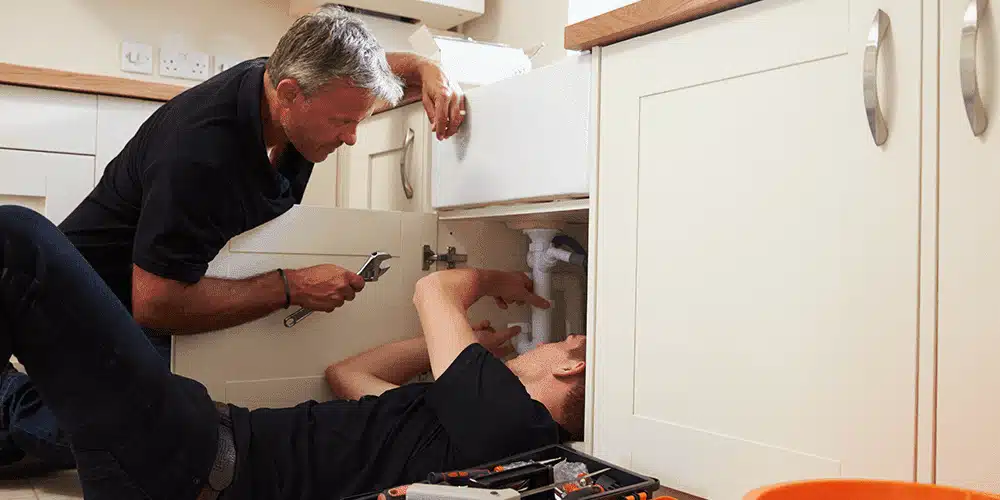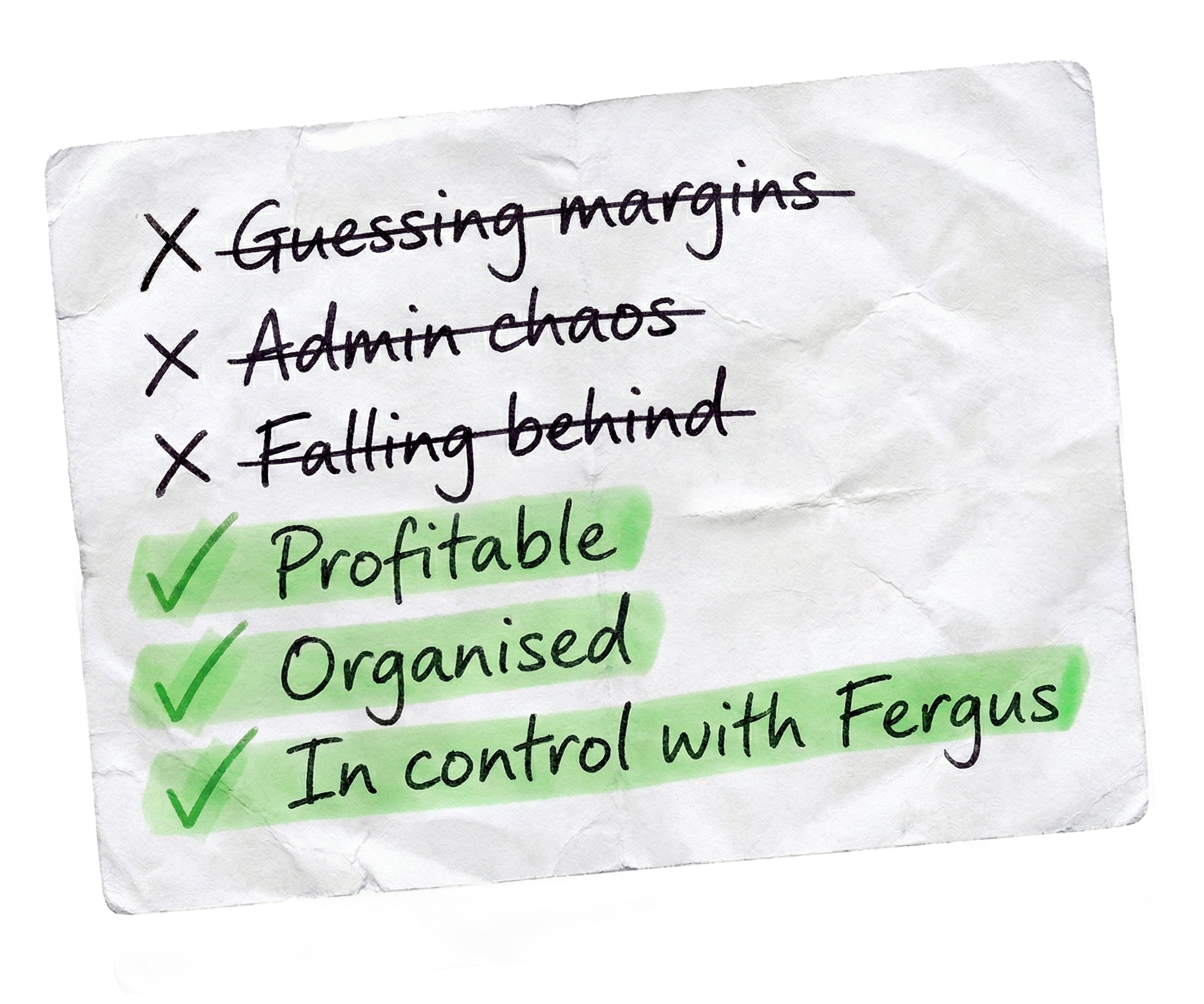
Let’s face it – you know your job and your trade …. but there’s a lot to think about when it comes to striking out on your own and starting your own trades business.
The excitement of starting a business means many tradies trip up on their success – plenty of jobs are coming in, but it’s a struggle to keep up the paperwork. Getting started is easy, but the real challenge is keeping it going.
Running a business is so much more than getting the next job done. To help you on your way, we’ve rounded up some of the best tips and advice for getting your trades business successfully off the ground.
It’s true – there’s much to be said about being the captain of your ship. But, from booking jobs to sourcing materials, billing customers, winning big jobs, paying suppliers and subcontractors, and sorting out the insurance – it all comes down to you.
As your own boss, you choose your customers, work on the jobs that mean the most to you, and you set your hours. If you have the relationships, the drive and the organisational skills and are prepared to work hard and think outside the box, you can build a business that will set you up for life.
A business plan is one of the first things you do when starting a new business. It helps you nail down your idea and how to make it happen. You should also invest some time in developing your business model. While your business plan tells you how your day-to-day activities will run, your business model outlines how your business will make money.
A business model describes how a business intends to make money. It explains who your customers are and how you deliver value to them. And the business model canvas lets you define these different components on a single page.
The left side of the canvas focuses on the business (internal factors that are mostly under your control). The right side of the canvas focuses on the customer or the market (external factors that aren’t under your control). In the middle, you get the value propositions representing the value exchange between your business and your customers.
It’s a much simpler way of understanding your value proposition (what you offer your customers), what sets you apart from your competitors, where your customers are and how you will structure your business.
Once you’ve developed your business model and set a plan for what you want to do, how and where, the next step is to get all the nuts and bolts in place, however, you can’t begin the process of registrations, insurance and more without a business name.
Choosing a business name may sound simple, but it’s essential to get it right because there are a lot of implications and costs associated with business name changes.
Firstly, create a short list of simple, memorable names that will reflect your business now and in the future. The next step is to ensure that the business name isn’t owned by someone else. You will need to check several sources to make sure that you can own all aspects of the name, including
It’s also essential to see if there is a history to your proposed name – businesses do come and go, and sometimes there is a significant risk of having the same name as a previous business.
Once you have confirmed that your business name is available on all platforms, lock it in. Register your business name using the Australian Government’s Business Registration Service (BRS). The BRS combines several business and tax registrations in one place, making it even easier to start a business.
Once your business name is registered and you have also applied for tax registration, the next steps are to insure your business and organise all your licencing requirements.
Before you start booking jobs, the final piece of the puzzle is putting the systems in place that you’ll need to run your business. This is everything from invoicing and financial management to managing subcontractors, booking jobs and communicating with customers and suppliers. It may be tempting to book jobs in your phone calendar app and handwrite invoices, but this isn’t scalable, and the busier you get, the harder it will be to keep up.
Job management software (JMS) combines all your admin activities to help automate and streamline your business, saving time, improving accuracy, and fast-tracking business operations. It’s the operational backbone of your business and can give you clarity and control while automating many of the tedious tasks you’d otherwise spend your evenings and weekends doing.
When choosing the right software, make sure it’s a system that knows your industry – for instance, software that is fit for a graphic designer is not the right software for trades businesses.
JMS for trades businesses will offer the right tools at the right time to get the job done without wasting any time and should include
ARTICLE: How do you know it’s time to invest in job management software?
Once you have all the tools in place and have a few clients on the books, it’s time to think about building a sustainable future. In this case, sustainability is not about thinking about the environment, your focus is on ensuring your business stands the test of time.
There’s often an ebb and flow to types of jobs. For example, if you’re only working on new housing developments, you might find yourself waiting around for work during lulls in residential construction before new land is released. Why not look into contracts for residential developments alongside commercial and industrial construction contracts, supplemented by maintenance and repair work?
While maintenance and repair work may seem as if you are covering a lot of small jobs for little return, there is the opportunity to think big – such as maintenance contracts with schools, aged care providers, retail precincts and more.
Consider registering your business as a preferred supplier through local and state government entities in your region to win larger contracts – more on this below!
Diversifying your client base means you can solidify your cash flow and create certainty – leading to opportunities to focus on growing and future-proofing your business.
Starting a new business can be isolating and overwhelming. Networking not only helps you build your reputation and visibility, but it’s also an opportunity to seek insights and advice from people who have already learned the hard lessons.
From business workshops to trade shows, professional associations and chambers of commerce – these networks are often the lifeblood of thriving local business communities.
Government-funded Business Enterprise Centres (BECs) operate across Australia and offer information, advice and assistance to business startups and existing business owners so that they are well-placed to develop their businesses as successful and profitable entities. Many of their services are subsidised or free to use, and they can help you with everything from marketing to legal and financial matters.
Having other professionals in your corner, like an accountant, is important to help you identify and make the most of opportunities to grow your business.
A network of experienced industry procurement and supply chain specialists who introduce large and small businesses to projects across Australia and New Zealand, the Industry Capability Network is funded by members and subscribers, including Australian and New Zealand federal, state and territory governments.
Through networks such as the ICN and your key contacts, you can collectively bid for jobs that, individually, you may need more resources or expertise to deliver. For example, if you’re a plumber, consider building a network of contacts across other trades, construction project managers, architects, engineers and others who may refer work to you.
A preferred supplier list (PSL) is a list of vetted service providers approved by an organisation to provide goods and services. All levels of government across Australia commonly use PSLs to find suppliers who address other community, economic or social needs.
To join a PSL, you might need to provide information about your traineeship programs, your environmental impact plan, local employment, gender equity, local industry support and more.
While this may seem like a significant amount of work, if your business demonstrates how it contributes to your community’s social and economic growth, you’ll be well-positioned to be selected for a wide range of opportunities. You can also use this information to compete for tenders or other large projects and win grants to help fund your business and projects.
The NSW Government Procurement Framework is an example of how governments select who they will do business with to achieve their key priorities.
Before competing to be recognised as a local preferred supplier, ask for the organisation’s procurement framework and take the time to consider how your trades business will be an ideal partner in this arrangement.
Preferred supplier directories, like this example from Western Australia, may also be published, which means you can point other potential customers to the list as proof that you can deliver what you need to complete their project.
Your business needs to be seen to grow, which means actively marketing and promoting your business to new and existing customers.
Your website and social media will often be the first contact a new client has with your business and should provide enough information and evidence of your expertise. Importantly, your website is the only component of your digital footprint that you will have complete control over – social media channels, review platforms, and other parties’ websites may not reflect all the information about your business in a way that helps you grow.
Your website should also hold a copy of your capability statement – a document that shows what your business can do and deliver. Think of it as a resume for your business.
Your capability statement is an important document if you want to become a supplier for a larger organisation (e.g. government) – you will usually need to include a capability statement to support your submission.
What are some easy ways you can promote your business?
Your marketing doesn’t have to be complex; it just needs to be consistent and accurately represent your business.
Governments want new and existing businesses to be successful, and they offer a range of supports, including grants programs and ways to connect with experts to help you build a strong business future.
You can register for grants alerts through the Australian Government’s dedicated grants platforms. Grants and support programs can also include:
There are many moving parts to starting and growing your trades business, but you don’t have to do it alone.
Don’t be afraid to ask for help – many people have already been in your shoes and are often more than happy to share their experiences, connect you with opportunities and help you get started. Chambers of Commerce and other business networks often have mentoring programs and will partner you with an industry expert.
Finally, make sure to have systems to reduce your administrative burden – job management software is vital in helping you focus on your core business.
Select a JMS partner who understands your industry and is tailored to meet your trades business needs.
Find out how the right software can help you build a successful trades business with a free trial.
Stop drowning in admin & paperwork. Start focusing on the jobs that make you money.



Our 20,000+ trades businesses have slashed their admin, are getting paid faster, and are finally enjoying their weekends again.






